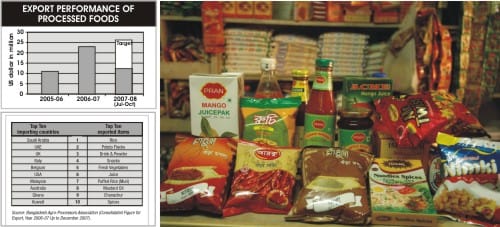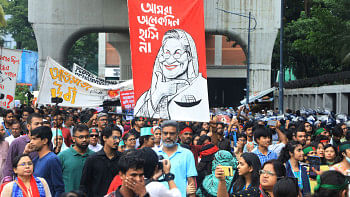Processed food export up on high demand from expats

Processed foods are on display at a shop in the capital. The export of processed foods has risen sharply in recent years boosted by Bangladeshis living abroad and new markets in Africa.Photo: STAR
The export of processed foods has risen sharply in recent years as Bangladeshis abroad try to satisfy their craving for a taste of their homeland by stocking up on pickles, spices and snacks imported from Bangladesh.
While traditional exports such as rice and potato flakes remain the country's largest food exports, drinks and snacks now exceed fresh vegetables as foreign currency earners, according to figures from the Bangladesh Agro-Processors Association.
"A large number of expatriate Bangladeshis want to have the taste of deshi food. And the demand for food items such as chanachur, puffed rice, aromatic rice, mustard oil, fried pulses and pickles are on the rise,” said Khurshid Ahmad Farhad, manager (export) of Square Consumer Products.
Bangladeshi foods are being sold from Australia to the USA, although Saudi Arabia and the Gulf states, with their hundreds of thousands of immigrant workers, are the largest markets.
Almost $2.9 million worth of food was exported to Saudi Arabia alone in the fiscal year 2006-07.
In total export earnings in the sector grew about 119 percent to $ 22.94 million in FY 2006-07 and rose 64 percent to $12.39 million in the first four months of the current fiscal year.
Cash incentive facilities offered by the government are also behind the sharp export growth of processed food products, according to Farhad.
Agricultural Marketing Company Limited (Pran), Eurasia Food Processing (BD), BD Foods and Arku are the leading exporters along with the Square Consumer Products.
It is not just non-resident Bangladeshis that are driving the growth. New markets are emerging in Africa, industry sources said. For example Ghana imported almost US$400,000 dollars worth of juice last fiscal year.
Kamruzzaman Kamal, PRAN's executive director for marketing said the successes in Africa were due to the improvements in product quality and the competitive price of Bangladeshi goods.
“We are trying to expand our coverage throughout the world,” he said, adding that the company has around 30 officials in different countries helping importers promote the company's products.
There are some areas where exports can be easily increased, industry leaders said. Square's Farhad pointed to Bangladeshi restaurants in the UK as a sector where sales could be boosted. Around 11,000 restaurants in the UK are operated by Bangladeshis, according to media reports.
However there are hurdles. Farhad said the lack of international standard quality and testing facilities for food products made things difficult.
“This is of paramount importance for boosting exports of food products throughout the world. It should be remedied as urgently as possible,” he said.
The agro processors' figures show that processed foods are now being exported to about 70 countries and they reveal some oddities. The UK is the largest buyer of Bangladeshi biscuits, and spent more than $1m on the country's snacks, while Ethiopia is the second largest importer of Bangladeshi candy. Italy was by far the largest buyer of Bangladeshi rice, importing $1.6 million worth in FY 2006-07.

 For all latest news, follow The Daily Star's Google News channel.
For all latest news, follow The Daily Star's Google News channel. 



Comments